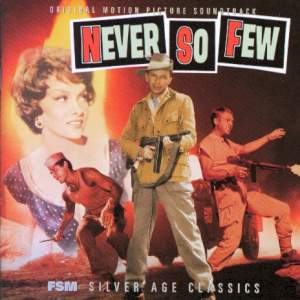Never So Few
Music composed by Hugo Friedhofer
7 Women
Music Composed by Elmer Bernstein
Available on Film Score Monthly Vol. 5 No. 20
Running Time: 74:35
Available from Film Score Monthly, 8503 Washington Boulevard, Culver City, CA90232; Tel: 1-888-345-6335; overseas: 310-253-9595; fax: 310-253-9588; email:Info@filmscoremonthly.com
Website: http://www.filmscoremonthly.com/

Never So Few, a 1959 war film set in the jungles of Burma, starred Frank Sinatra (Captain Tom Reynolds) and Gina Lollobrigida (Carla) with Peter Lawford, Paul Henreid and Steve McQueen in one of his earliest screen roles.
The Main Title sets the scene immediately. Jungle rhythms and Thai scales over a churning bass ostinato create a sense of urgency and danger. Such brooding, menacing material - sometimes with heroic snare drum beating, to stiffen resolve - stalks the scenes of combat.
But much of the score is lushly romantic. For Carla, Friedhofer creates an exotic alluring theme heard in a number of variations e.g. – as a light dance number in a nightclub, in jazz blues treatment, and as a lush romantic statement in the Steiner tradition. From ‘Carla’ this effulgence spills over into the romanticism of ‘Conservatory’ and ‘Like Wow!’.
One of the highlights of Friedhofer’s creation is the brilliantly coloured ‘Morning Ride’ evoking the gorgeous Thai scenery, featuring shimmering brass and strings over repeated cells for pitched percussion (emulating a gamelan band). ‘Over the Border’ is another colourful landscape, although its beauty is counterbalanced by a sense of omnipresent danger.
Of the source music, ‘Kachin Koncerto’ is the most striking. It is another memorable piece of exotica. Charles Wolcott composed and conducted what is really three overlaid recordings: a six-member gamelan band, maracas and jingles, and a gong. The piece stops short as the Japanese launch a sneak attack. Other source music is comprised of popular standards such as Cole Porter’s ‘Easy to Love’.
7 Women (1966) was John Ford’s last film and his one and only collaboration with Elmer Bernstein. It told the story of a group of female missionaries threatened by Mongols in 1935 China. It starred Margaret Leighton, Anne Bancroft, Flora Robson, Eddie Albert, Sue Lyon and Betty Field.
Bernstein’s 7 Women score kicks off with his trademark syncopated rhythms in his fast-moving hard-hitting western style. Only a few broad exotic strokes divide the Main Title from the world of The Magnificent Seven. In fact the music underscores the opening sequence of Mongol warriors on horseback.
It is interesting to compare this music with Jerry Goldsmith's, much better-known 1966 oriental The Sand Pebbles score. Equally strong, assured character studies and exotic scene painting, go hand-in-hand in this 7 Women music. Bernstein’s music is basically gently feminine, caring and compassionate but quirky in its description of the women’s foibles. ‘Lady Strange Love’ where Miss Andrews (Margaret Leighton) interrupts Mr Pether’s (Eddie Albert) teaching class has brittle, prim harpsichord alternating with pert tender child-like woodwind phrases. (This combination will be a dominant factor in the score.) Later, fluttering, somewhat remote woodwind and harp figures suggest the repressed side of Andrews’s personality and her lesbian leanings. ‘Baby Blues’ – melancholy jazz blues mixed with light oriental percussion underscores talk of an unborn child.
Contrastingly warlike and disruptive material is heard in cues like ‘Of Tunga Khan’. Based on pentatonic Chinese music, it is a heavy and ominous theme for the Mongolian warlord that develops into a brutal stately procession. Powerful, urgent staccato rhythms and pounding percussion signal the onset of ‘Plague’ with material reminiscent of Jerome Morros’s The Big Country music. Brutal, percussive piano and crushing oriental rhythms pervade ‘Madness’ and the score ends in resignation and despair as Cartwright (anne Bancroft) gives herself to the Mongol chief then poisons him, and herself.
Two powerful, colourful oriental scores. Friedhofer’s contrasts evocative music for the jungle locale, and warfare, with alluring sensual romantic music. Bernstein’s score has more unusual downbeat music for Ford’s study of seven very different missionary women threatened by barbaric Mongol warriors.
Ian Lace
Never So Few:
4
7 Women:3
Return to Index